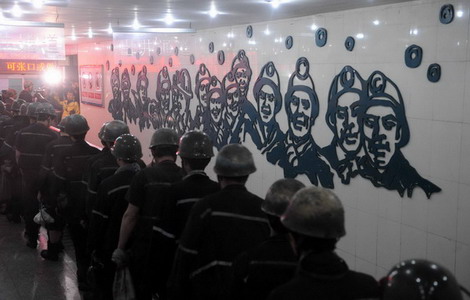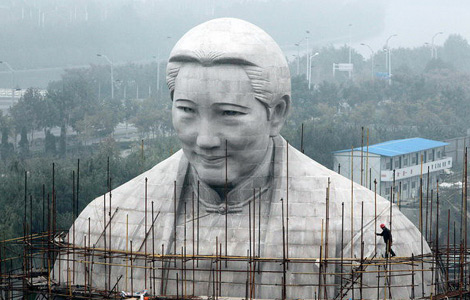More leading officials publicly selected
Updated: 2010-12-05 07:42
(Xinhua)
|
|||||||||||
BEIJING- The Municipal Party School in Suzhou City, East China's Jiangsu Province, received a special group of "students" Friday morning for a class on current economic development and future trend.
| ||||
They were survivors of one of the nation's public selection campaigns for leading officials this year.
In China's Northwestern Xinjiang Uygur autonomous region, meanwhile, the fiercest-ever competition just entered its final phase. Out of 1134 candidates, only 103 contenders were left after the primary selection - using written exams and interviews, to head for the final 34 departmental level posts.
The selection campaigns starting throughout the nation this year were unprecedented in scale and in the number of posts offered, with nearly 400 above deputy departmental level positions open to the public in provinces of Beijing, Zhejiang, Shaanxi, Hunan, Jiangsu, Sichuan, Jiangxi, Shenzhen, Tianjin, Hainan, Guizhou, Jilin, Shandong and Xinjiang.
The move displayed the advantage of the public selection system for leading cadres (PSSLC), said Zhuang Yan, deputy head of the provincial Organization Department in Jilin.
He said the open selection created a stage for those competent persons, compared with the traditional way to appoint mid-to-top officials only by orders.
The province had broken down the identity restrictions by holding out an olive branch to managers from large enterprises, listed companies and financial institutes, as well as so-called "sea turtles," Chinese returnees from overseas.
This sent 1,889 candidates from all parts of China, except Hong Kong, Macao and Tibetan Autonomous Region, to the province's written tests.
"It is unimaginable in the past. Anyone eligible for the registration requirements can attend the departmental level selection exams," said 40-year-old Shen Desheng, a former municipal taxation bureau head and now the newly-appointed deputy head of the provincial taxation bureau in Jilin.
As he recalled from how he applied for the position on 26 June to the day he was informed of information publicity on 9 November, a final step to solicit public opinions before admission, Shen said "it was very intense with 37.8 persons fighting for one position during the written test and two for one in the final stage."
However, this selection system, seen as more fair and just, is now widely pursued by China's local personnel reforms.
Zhejiang, in southern China, introduced live TV broadcasts to involve public participation, in addition to the sole evaluation by leaders and experts, while east China's Shandong made an effort to promote the method of "democratic nomination, multi-candidate elections and whole-course supervision."
Dai Guohong, now deputy head of Jiangsu's Changshu Institute of Technology, used to work in Changzhou City for 22 years. When he applied for the position, he was not as confident since some his superiors were among the 50 contenders.
When he finally won the intense competition, he found the selection was rather open and transparent, and sought to offer each position to the right person.
"The whole process was covered by the media, even when the provincial Party's standing committee voted for the final," said Shen, who won the "double champion" based upon written exams and probation.
"All my colleagues applauded for me on the day I was posted for the information publicity. I was greatly encouraged and felt so confident for the future job," he added.
Yang Xuezhong, head of the Organization Department at the Baixia District Committee in Jiangsu's Nanjing City, commented that the openness and transparency of the whole process was exactly the strength of open selections.
"It not only grants credibility to the selection, but also increases the public participation in political decisions," he said.
Meanwhile, youthful, highly-educated and high-quality participants were featured in the country's public selections of mid-to-top cadres.
Among the 30 candidates for deputy departmental level posts to be assumed in Jiangsu, 24 had master degrees, 18 had senior professional titles, and half were under 45 years old, while of the 38 candidates for Beijing's offer, 13 had Ph.D degrees, half with master degrees, and the average age was 41.2 years.
The 12th five-year plan outlined by the 17th Central Committee of the Communist Party of China (CPC), urged the country to further reform its personnel system, which was also echoed by the nation's experts.
They believed that open competitive elections, or open multi-candidate elections, would be one of the most important parts while deepening the reform, and higher positions would be offered to the general public in the future.
"It's an eye-catching move in China's social development as the positions opening to the public become higher and higher," said Li Yun, associate research fellow at the Society Department affiliated with the provincial Academy of Social Sciences in Jilin.
"What we have to work on in the future is to enlarge the candidate groups as well as to find the right path to reach those of great abilities," Li noted.
The ongoing campaigns highlighted the improvements made in the nation's cadres selection and appointment system (CSAS), said Wang Yukai, secretary of the China Society of Administrative Reform and professor at the China National School of Administration.
China's actions to strengthen the supervision over officials and reform the evaluation standards over recent years were a strong indication of its determination to improve the personnel system, as well as the best practices to win the trust of the public, he said.
Hot Topics
Libya conflict, Gaddafi, Oil spill, Palace Museum scandal, Inflation, Japan's new PM, Trapped miners, Mooncake tax, Weekly photos, Hurricane Irene
Editor's Picks

|

|

|

|

|

|









